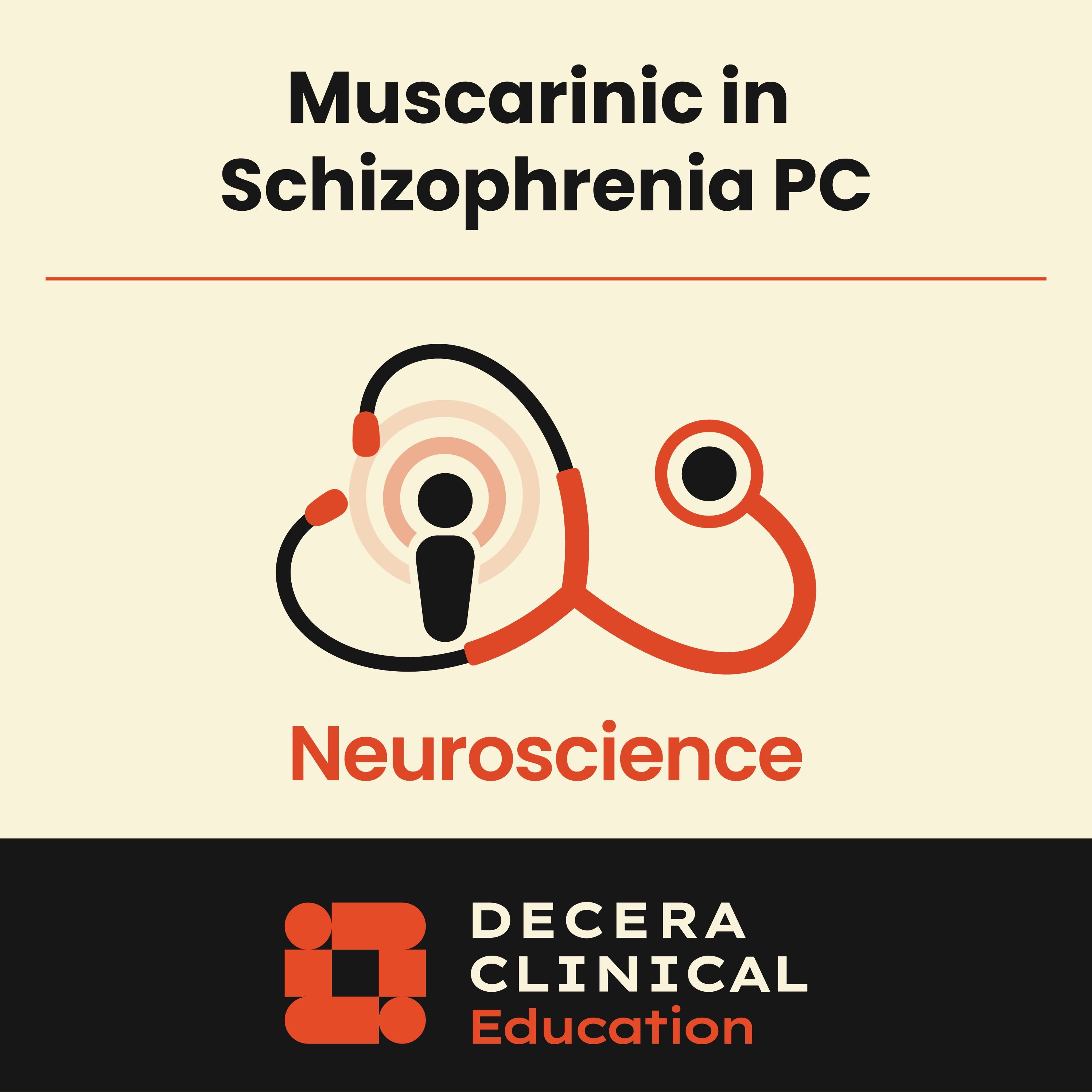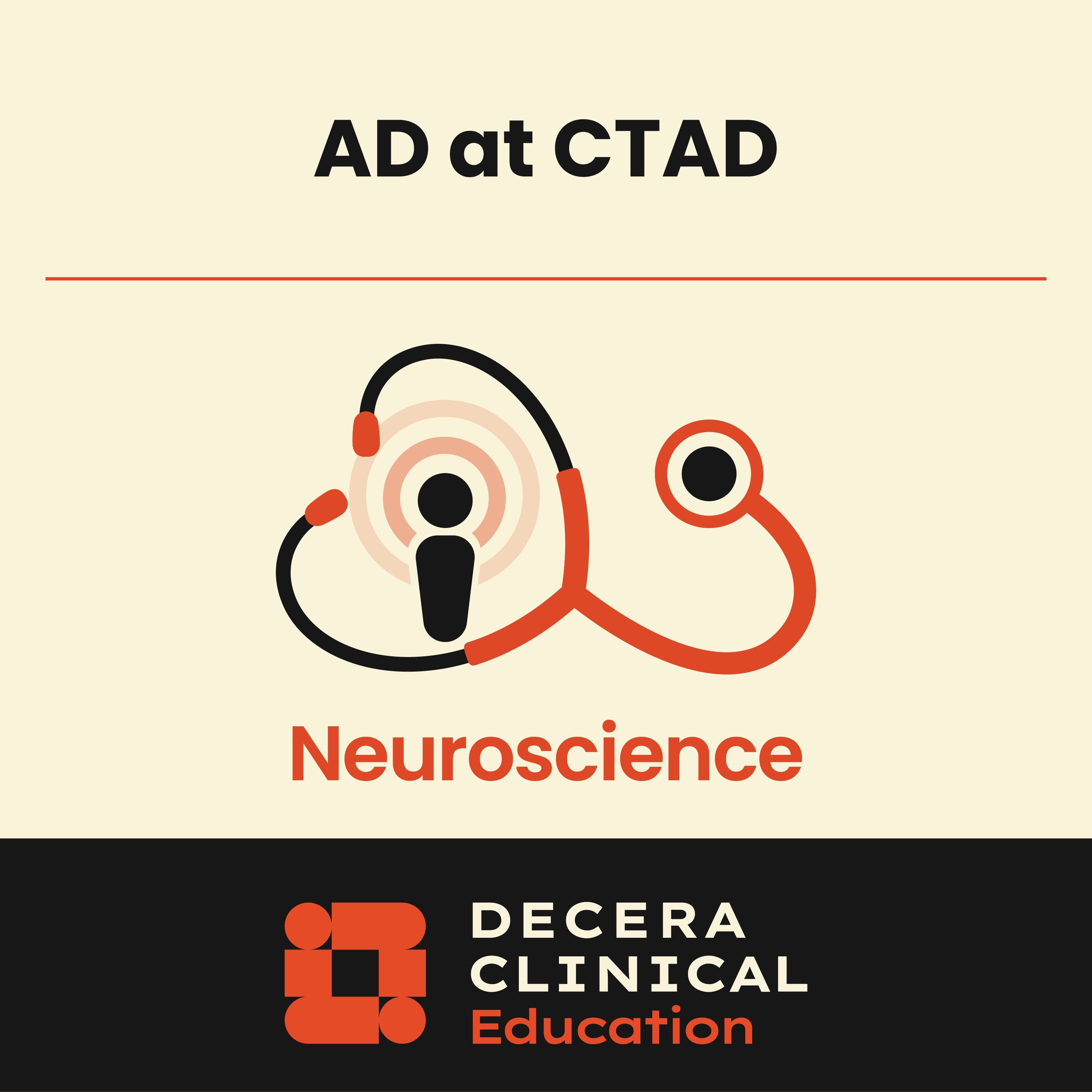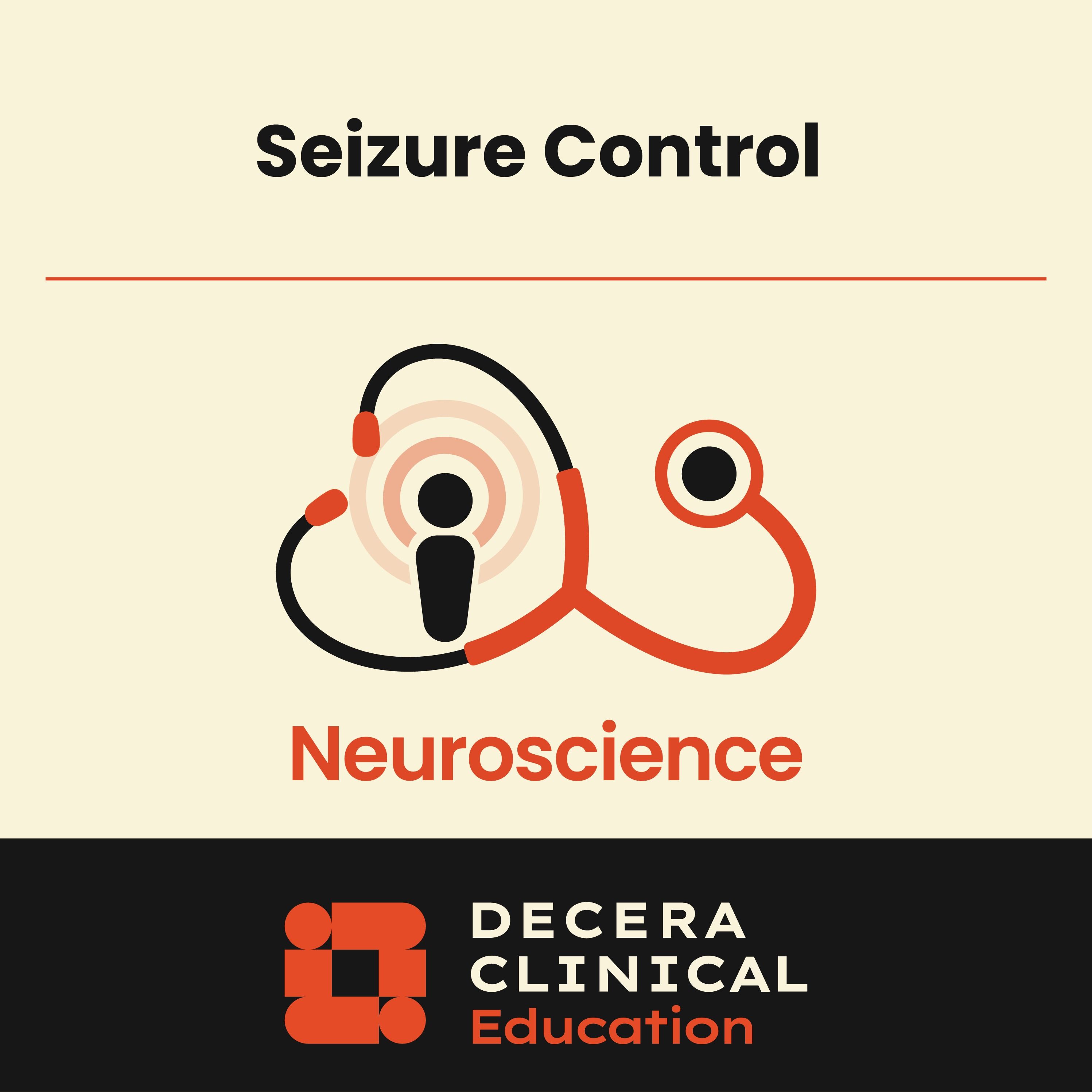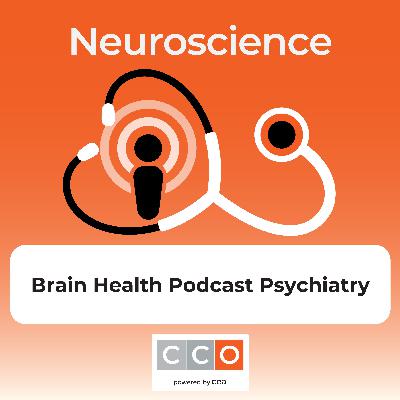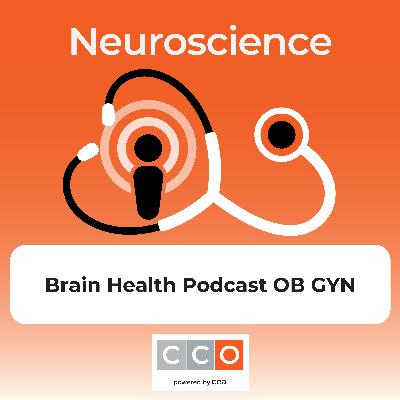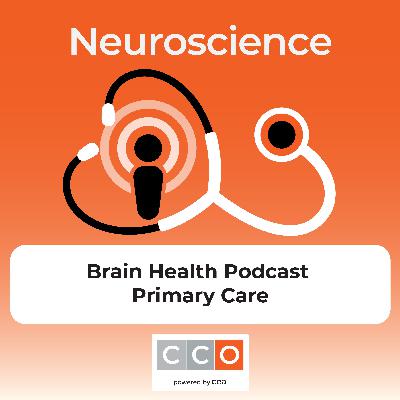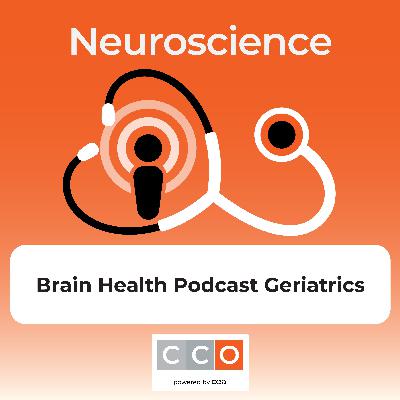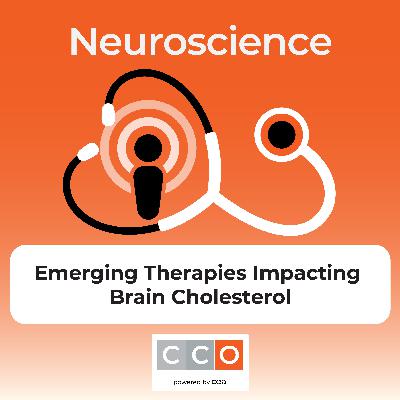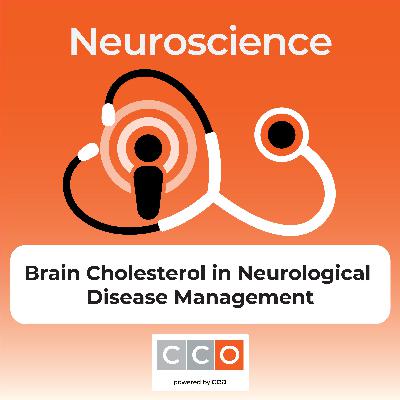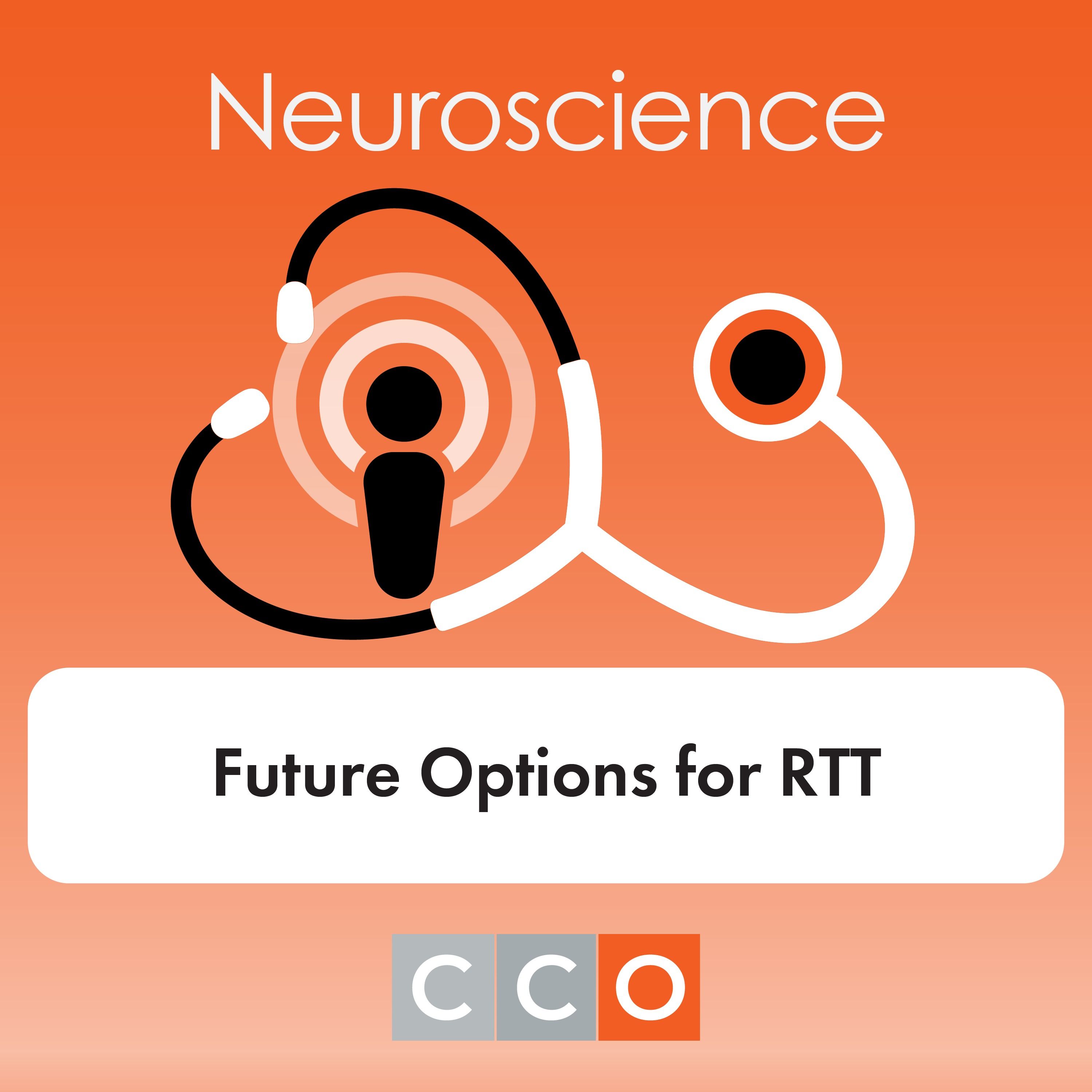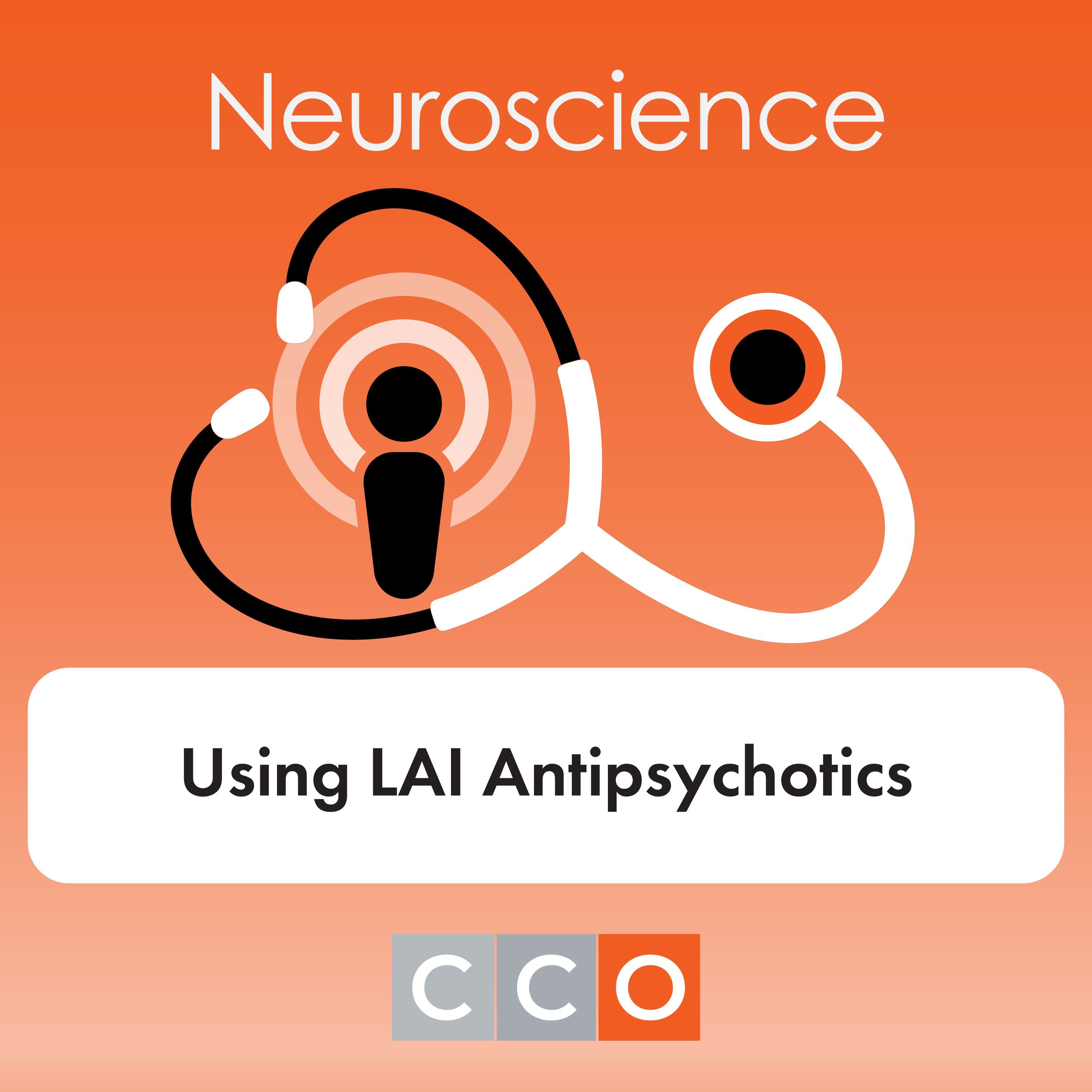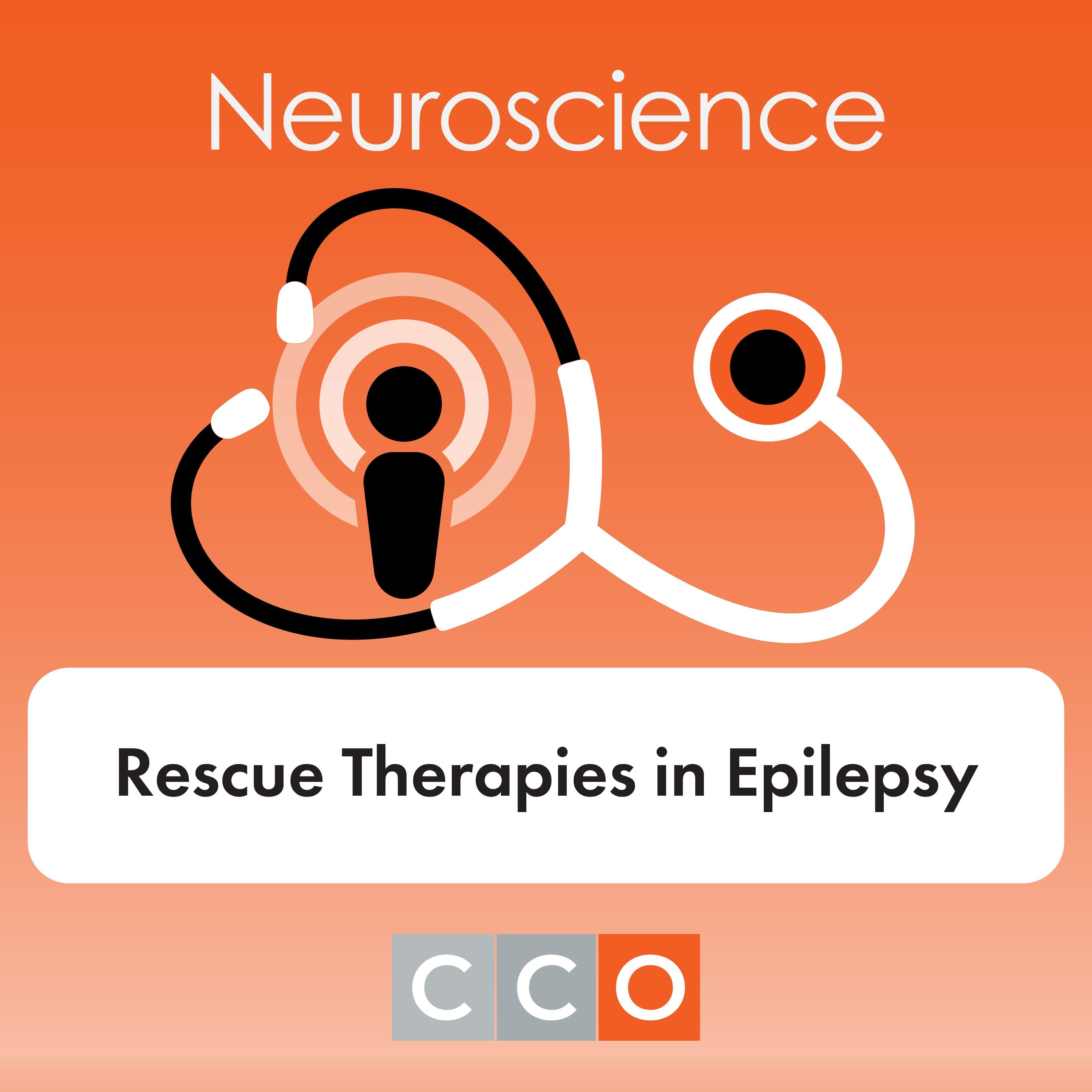Discover Decera Clinical Education Neuroscience Podcast
Decera Clinical Education Neuroscience Podcast

Decera Clinical Education Neuroscience Podcast
Author: Decera Clinical Education
Subscribed: 28Played: 66Subscribe
Share
© 2021 Decera Clinical Education Neuroscience Podcast
Description
Updates on new data and best practices in patient care across a wide variety of psychiatric and neurological illnesses from Decera Clinical Education. Gain a deeper understanding and practical clinical insights on topics ranging from bipolar depression to Parkinson’s disease psychosis. Select episodes available for CME/CE credit.
42 Episodes
Reverse
In this podcast episode, Dr Jonathan Meyer answers additional questions from learners at our Psychopharmacology Update conference. Questions explore other disease states where psychosis can occur, practical considerations around special populations, tolerability, drug combinations, and the potential future of muscarinic-based therapies. For additional activities in this program including a ClinicalThought commentary, a CME/CE/CPE certified on-demand webcast and a downloadable slideset, go to: https://bit.ly/4qjcYcjFaculty:Jonathan M. Meyer, MD, DLFAPAVoluntary Clinical Professor of PsychiatryUniversity of California, San DiegoSenior Academic AdviserCalifornia Department of State HospitalsSan Diego, CaliforniaGet access to all of our new podcasts by subscribing to the CCO Neuroscience Podcast on Apple Podcasts, YouTube Podcasts, or Spotify. Hosted by Simplecast, an AdsWizz company. See pcm.adswizz.com for information about our collection and use of personal data for advertising.
In this episode of “Cognitive Conversations,” expert faculty discuss breaking data presentations from the 2026 Clinical Trials on Alzheimer’s Disease conference held in San Diego, California, from December 1-4, 2025, and their implications for clinical practice.Topics covered include:Evoke and evoke+ phase III trials of semaglutideSubcutaneous lecanemab as initiation and maintenance treatmentBlood-based biomarker assaysTrontinemab and other brain shuttlesTau targeting therapies in developmentPreventive impact of BCG and herpes zoster vaccinationThis podcast episode is part of the CME/CE-accredited program, “Early Clues, Lasting Impact: Detecting and Treating Alzheimer’s Disease in Its Earliest Stages,” supported by an educational grant from Novo Nordisk. Faculty:Anton P. Porsteinsson, MD William B. and Sheila Konar Professor of Psychiatry, Neurology, and Neuroscience, and MedicineDirector, Alzheimer's Disease Care, Research and Education Program (AD-CARE)University of Rochester School of Medicine and DentistryRochester, New YorkVijay K. Ramanan, MD, PhDConsultant and Associate ProfessorDirector, Alzheimer’s Disease Treatment ClinicDepartment of NeurologyMayo ClinicRochester, Minnesota Link to obtain CME/CE credit: https://bit.ly/4999otE Hosted by Simplecast, an AdsWizz company. See pcm.adswizz.com for information about our collection and use of personal data for advertising.
In this podcast episode, epilepsy specialists Danielle Becker, MD, MS, FAES, and Sarah Weatherspoon, MD, discuss the personalization of the most recently available epilepsy rescue treatments for younger kids and their implementation by the patient care team.Faculty:Danielle Becker, MD, MS, FAES Division Director of EpilepsyAssociate Professor of NeurologyThe Ohio State University Wexner Medical CenterColumbus, Ohio Sarah Weatherspoon, MDAssociate Chief of Child NeurologyTuberous Sclerosis Center of Excellence, Neurology Co-DirectorLe Bonheur Children's HospitalUniversity of Tennessee Health Science CenterMemphis, TennesseeResources mentioned in this episode:Epilepsy Foundation Seizure Action Plan ToolkitCDC Managing Epilepsy Well (MEW) NetworkLink to Brain Health Hub with additional educational activities: https://bit.ly/3Y12Isx Hosted by Simplecast, an AdsWizz company. See pcm.adswizz.com for information about our collection and use of personal data for advertising.
In this episode, Alireza Atri, MD, PhD, discusses his approach to patient conversations on brain health and provides advice to healthcare professionals practicing in community neurology settings, in a dialogue with Robin Martinez, a patient advocate from the Smart Patients online community. Supported by an educational grant from Lilly.Faculty:Alireza Atri, MD, PhD Chief Medical Officer, Banner ResearchPhoenix, Tucson and Sun City, ArizonaDirector, Banner Sun Health Research InstituteSun City, ArizonaRobin MartinezPatient AdvocateCoordinator of Online CommunitiesWebsite AdministrationSmart Patients Inc.Denver, ColoradoResources mentioned in this episode:Alzheimer’s Association: DETeCD-ADRD Clinical Practice Guidelines for Specialty Care https://bit.ly/4kqtYt5American Geriatrics Society: 2023 Beers Criteria for Potentially Inappropriate Medication Use in Older Adults https://bit.ly/44zN8qGMoCA (Montreal Cognitive Assessment) : [Link to: https://mocacognition.com/]Link to obtain CME/CE credit: https://bit.ly/44khuP5Link to Brain Health Hub with additional educational activities:https://bit.ly/4kziu6T Hosted by Simplecast, an AdsWizz company. See pcm.adswizz.com for information about our collection and use of personal data for advertising.
In this episode, dementia expert Anton Porsteinsson, MD, discusses his approach to conversations on brain health with patients and provides guidance for HCPs practicing in community psychiatry settings, in a dialogue with Robin Martinez, a patient advocate from the Smart Patients online community. Supported by an educational grant from Lilly.Faculty:Anton P. Porsteinsson, MD William B. and Sheila Konar Professor of Psychiatry, Neurology, Neuroscience, and MedicineDirector, Alzheimer’s Disease Care, Research and Education Program (AD-CARE)University of Rochester School of Medicine and DentistryRochester, New YorkRobin MartinezPatient AdvocateCoordinator of Online CommunitiesWebsite AdministrationSmart Patients Inc.Denver, ColoradoResources mentioned in this episode:Mini Mental State Examination (MMSE) [Link to: https://www.psychdb.com/_media/mmse.]Mini-Cog (quick dementia screening test) [Link to: https://mini-cog.com/]MoCA (Montreal Cognitive Assessment) : [Link to: https://mocacognition.com/]Alzheimer’s Association Local Chapters [Link to:https://www.alz.org/chapter-search]Local Department of Aging [Link to : https://www.thecountyoffice.com/department-of-aging/]Link to obtain CME/CE credit: https://bit.ly/3IAbyc7Link to Brain Health Hub with additional educational activities: https://bit.ly/40Jgth4 Hosted by Simplecast, an AdsWizz company. See pcm.adswizz.com for information about our collection and use of personal data for advertising.
In this episode, Genevieve Neal-Perry, MD, PhD, discusses her approach to conversations on brain health with her patients in obstetrics and gynecology settings, in a dialogue with Robin Martinez, a patient advocate from the Smart Patients online community. Supported by an educational grant from Lilly.Faculty:Genevieve Neal-Perry, MD, PhD Robert A. Ross Distinguished ProfessorChair of Obstetrics and GynecologyUniversity of North Carolina School of MedicineChapel Hill, North CarolinaRobin MartinezPatient AdvocateCoordinator of Online CommunitiesWebsite AdministrationSmart Patients Inc.Denver, ColoradoResources mentioned in this episode:Smart Patients, an online community for patients and their families [Link to: https://www.smartpatients.com/]Link to obtain CME/CE credit: https://bit.ly/4lH4BEtLink to Brain Health Hub with additional educational activities:https://bit.ly/4nJrgSG Hosted by Simplecast, an AdsWizz company. See pcm.adswizz.com for information about our collection and use of personal data for advertising.
In this episode, Pierre N. Tariot, MD, discusses his approach to conversations on brain health with his patients and their family members in primary care settings, in a dialogue with Robin Martinez, a patient advocate from the Smart Patients online community. Supported by an educational grant from Lilly.Faculty:Pierre N. Tariot, MDDirectorBanner Alzheimer's InstituteResearch Professor of PsychiatryUniversity of Arizona College of MedicinePhoenix, ArizonaRobin MartinezPatient AdvocateCoordinator of Online CommunitiesWebsite AdministrationSmart Patients Inc.Denver, ColoradoResources mentioned in this episode:Banner Alzheimer InstituteECHO (Extension for Community Healthcare Outcomes)MoCA (Montreal Cognitive Assessment)Mini-Cog (quick dementia screening test)FDA Clears First Blood Test Used in Diagnosing Alzheimer’s DiseaseLancet Commission: Dementia Prevention, Intervention, and Care 2024Link to obtain CME/CE credit:https://bit.ly/4kk1vFsLink to Brain Health Hub with additional educational activities:https://bit.ly/3H4hoSl Hosted by Simplecast, an AdsWizz company. See pcm.adswizz.com for information about our collection and use of personal data for advertising.
In this episode, Susan Scanland, MSN, CRNP, GNP-BC, CDP, discusses her approach to conversations on brain health with her patients and their family members in clinical practice as a gerontological nurse practitioner, in a dialogue with Robin Martinez, a patient advocate from the Smart Patients online community. Supported by an educational grant from Lilly.Faculty:Susan Scanland, MSN, CRNP, GNP-BC, CDPCEO & FounderDementia Connection LLCClarks Summit, PennsylvaniaRobin MartinezPatient AdvocateCoordinator of Online CommunitiesWebsite AdministrationSmart Patients Inc.Denver, ColoradoResources mentioned in this episode:Alzheimer’s Association: 2025 Alzheimer’s Disease Facts and FiguresLancet Commission: Dementia Prevention, Intervention, and Care 2024American Geriatrics Society: 2023 Beers Criteria for Potentially Inappropriate Medication Use in Older AdultsAlzheimer’s Association: DETeCD-ADRD Clinical Practice Guidelines for Primary CareClinical Care Options: Integrating Brain Health Discussions Into Your Daily RoutineLink to obtain CME/CE credit:https://bit.ly/4mqHoaSLink to Brain Health Hub with additional educational activities:https://bit.ly/3H4hoSl Hosted by Simplecast, an AdsWizz company. See pcm.adswizz.com for information about our collection and use of personal data for advertising.
Listen in as Cristina Mussini, MD; Martin Witzenrath, MD, FERS; and Michele Bartoletti, MD, PhD, discuss best practices in managing people who are immunocompromised with COVID-19 in the hospital setting, including: COVID-19 burden among this populationInitial workup to assess disease severitySummary of COVID-19 guideline recommendationsA detailed patient case to illustrate key takeawaysPresenters:Michele Bartoletti, MD, PhDAssociate Professor of Infectious DiseasesDepartment of Biomedical SciencesHumanitas UniversityPieve Emanuele (MI), ItalyHead of Infectious Diseases UnitIRCCS Humanitas Research HospitalRozzano (MI), ItalyCristina Mussini, MDFull Professor of Infectious DiseasesChief of the Department of Infectious DiseasesUniversity of Modena and Reggio EmiliaModena, ItalyMartin Witzenrath, MD, FERSMedical DirectorCharite Centrum 12Internal Medicine & DermatologyProfessor and Chair for Respiratory Medicine and Critical CareDepartment of Infectious Disease, Respiratory Medicine and Critical CareCharite Campus Mitte/Campus Virchow Klinikum/Campus Benamin FranklinCharite – University of BerlinBerlin, GermanyLink to full program:https://bit.ly/4fs7HcbDownloadable slides: https://bit.ly/4imCRU5Get access to all of our new podcasts by subscribing to the CCO Infectious Disease Podcast on Apple Podcasts, Google Podcasts, or Spotify. Hosted by Simplecast, an AdsWizz company. See pcm.adswizz.com for information about our collection and use of personal data for advertising.
In this episode, Dr Robert Cotes and Dr David Goldsmith discuss their clinical experience with long-acting injectable antipsychotic treatments in the Grady Health System, with a focus on communication strategies to educate patients on their treatment options and engage them in shared decision-making.Presenters: Robert O. Cotes, MD, DFAPAAssociate Professor and Distinguished PhysicianDirector, Clinical & Research Program for Psychosis at Grady Health SystemDirector, Project ARROW at Grady Health SystemDepartment of Psychiatry and Behavioral SciencesEmory University School of MedicineAtlanta, GeorgiaDavid R. Goldsmith, MD, MScAssociate ProfessorDirector, Inflammation, Motivation, and Negative Symptoms of Schizophrenia (InMotioNSS) LabCo-Director, Clinical & Research Program for Psychosis at Grady Health SystemDirector, PSTAR Clinic at Grady Memorial HospitalFaculty, Emory Behavioral Immunology ProgramCo-Director, Psychiatry Residency Research TrackDepartment of Psychiatry and Behavioral SciencesEmory University School of MedicineAtlanta, GeorgiaThis content is part of an online CME program supported by educational grants from Indivior Inc.; Otsuka America Pharmaceutical, Inc. and Lundbeck; and Teva Pharmaceuticals. Link to full program: https://bit.ly/414XkY4 Hosted by Simplecast, an AdsWizz company. See pcm.adswizz.com for information about our collection and use of personal data for advertising.
In this episode, David N. Lieberman, MD, PhD, and Eric Marsh, MD, PhD, discuss recent updates relevant to the treatment of Rett syndrome, including:The recently updated Comprehensive Care Guidelines from the International Rett Syndrome Foundation, available at rettsyndrome.orgOngoing collection and analysis of longitudinal data within the Rett Syndrome Natural History StudyEfficacy and safety data from the double-blind, placebo-controlled phase III registrational LAVENDER trial evaluating oral trofinetide, a small molecule analogue of insulin-like growth factor 1Topline results from phase III AVATAR and EXCELLENCE trials of the sigma-1 receptor agonist blarcamesineSeveral early ongoing gene therapy trialsDr Lieberman and Dr Marsh complement this informative update with wisdom from their own clinical experience to provide a full picture of current treatment and management options available to patients with Rett syndrome.Presenters: David N. Lieberman, MD, PhDDirector, Comprehensive Rett Syndrome ClinicDepartment of NeurologyBoston Children's HospitalBoston, MassachusettsEric Marsh, MD PhDClinical Director, Orphan Disease CenterDirector (MPI), CHOP/Penn IDDRCProfessor, Departments of Neurology and PediatricsDivision of NeurologyChildren’s Hospital of PhiladelphiaPerelman School of MedicineUniversity of PennsylvaniaPhiladelphia, PennsylvaniaThis content is part of an online CME program in partnership with the International Rett Syndrome Foundation and supported by an educational grant from Acadia Pharmaceuticals. Link to full program:https://bit.ly/4fJRRL0 Hosted by Simplecast, an AdsWizz company. See pcm.adswizz.com for information about our collection and use of personal data for advertising.
Link to CME: Claim Credit - https://bit.ly/3OByCaEIn this episode, Drs. Halford and Hahn discuss the current treatment landscape of developmental and epileptic encephalopathies (DEEs), such as Lennox-Gastaut syndrome and Dravet syndrome, and the emerging role of brain cholesterol in addressing seizure frequency. The full episode covers:How to diagnose these epilepsies and the FDA-approved treatment options in the first-line and second-line settingsThe role of antiseizure medications in DEE treatment managementThe nonpharmacological treatment options available to patients with DEEsThe emerging role of brain cholesterol in neurologic diseases like DEEs and Alzheimer’s diseaseResults from the ELEKTRA clinical trial, including cholesterol synthase inhibitors’ impact on seizure frequencyThe future of soticlestat as a treatment option for pediatric patients with DEEsPresenters:Jonathan J. Halford, MDProfessorDirector, Translational Research UnitDepartment of NeurologyMedical University of South CarolinaCharleston, SCCecil Hahn, MD, MPH, FRCPCProfessorPediatric EpileptologistUniversity of TorontoToronto, Ontario, CanadaContent based on an online CME program supported by an independent educational grant from Takeda Pharmaceuticals U.S.A., Inc.Link to full program: https://bit.ly/45UUpQy Hosted by Simplecast, an AdsWizz company. See pcm.adswizz.com for information about our collection and use of personal data for advertising.
Link to CME: Claim Credit - https://bit.ly/3wbVkA1In this episode, Drs. Halford and White discuss the emerging role of brain cholesterol in the development and potential treatment of neurological diseases like epilepsy or Alzheimer and Huntington diseases. The full episode covers:Overview of brain cholesterol and its function in the bodyPathogenesis potential for certain diseases via brain cholesterolEmerging research on a cholesterol synthase inhibitor as a novel therapyThe future of soticlestat as a potential treatment option for pediatric epilepsies—Lennox-Gastaut syndrome and Dravet syndrome—and other neurological diseasesPresenters:Jonathan J. Halford, MDProfessorDirector, Translational Research UnitDepartment of NeurologyMedical University of South CarolinaCharleston, SCH. Steve White, PhDProfessor, Department of PharmacyCo-Director, Center for Epilepsy Drug DiscoverySchool of PharmacyUniversity of WashingtonSeattle, Washington Hosted by Simplecast, an AdsWizz company. See pcm.adswizz.com for information about our collection and use of personal data for advertising.
In this episode, Drs. Sabbagh and Isaacson discuss how to best approach Alzheimer’s disease (AD) and mild cognitive impairment (MCI) in clinical practice, including accurately diagnosing patients and optimizing treatment in terms of patient preferences and reimbursement options. The full episode covers:Defining AD and MCI and their clinical presentationHow to diagnose AD vs MCIReimbursement landscape for current diagnosing and monitoring toolsPrecision medicine’s evolving role in diagnosing and treating patients with AD and/or MCI Presenters:Marwan Sabbagh, MDProfessor of NeurologyAlzheimer’s and Memory Disorders DivisionDepartment of NeurologyBarrow Neurological InstitutePhoenix, ArizonaRichard Isaacson MDDirector of the Institute for Neurodegenerative DiseasesFlorida Hosted by Simplecast, an AdsWizz company. See pcm.adswizz.com for information about our collection and use of personal data for advertising.
The treatment landscape of major depression is increasingly shifting from monoaminergic agents to agents that modulate glutamate and GABA. Healthcare professionals need to stay up to date and educated on these changes in order to discuss the most current treatment options with their patients. In this podcast episode, we interview Dr Anita Clayton, a clinician researcher who has been involved in some of the clinical trials for these novel glutamatergic and GABAergic medications, and ask her key questions about mechanism of action and clinical application. Listeners will come away from this podcast episode more informed and more excited for the future of major depression care. Presenters:Anita Clayton, MDDavid C. Wilson Professor and ChairDepartment of Psychiatry and Neurobehavioral SciencesProfessor of Clinical Obstetrics and GynecologyUniversity of Virginia School of MedicineCharlottesville, VirginiaThis podcast episode is supported by an educational grant from Sage Therapeutics, Inc. and Biogen.Link to full program:https://bit.ly/3YdPMPa Hosted by Simplecast, an AdsWizz company. See pcm.adswizz.com for information about our collection and use of personal data for advertising.
Rett syndrome is a rare but severe neurodevelopmental disorder, and current treatment approaches primarily focus on symptom management and supportive care. However, recent clinical developments are providing hope for a changing treatment landscape. In this podcast episode, experts in Rett syndrome David N. Lieberman, MD, PhD, and Jeffrey Neul, MD, PhD, discuss trofinetide and blarcamesine, 2 agents in late-stage clinical trials as treatment options for Rett syndrome. Throughout their conversation, Drs Lieberman and Neul review the pivotal LAVENDER, DAFFODIL, AVATAR, and EXCELLENCE trials, including information on the safety and efficacy profiles of trofinetide and blarcamesine. The experts end their discussion with a conversation about the potential roles of ketamine and gene therapy in the management of Rett syndrome. Presenters:David N. Lieberman, MD, PhDInstructorDepartment of NeurologyHarvard Medical SchoolAttending PhysicianChild NeurologyBoston Children’s HospitalBoston, MassachusettsJeffrey Neul, MD, PhDDirectorPediatricsVanderbilt University Medical CenterNashville, TennesseeThis activity is supported by educational funding provided by Acadia Pharmaceuticals Inc.To claim CME/CE credit for this podcast, complete the posttest here: bit.ly/3JR4qq5.For additional activities in this program, visit bit.ly/3JR4qq5 Hosted by Simplecast, an AdsWizz company. See pcm.adswizz.com for information about our collection and use of personal data for advertising.
Rett syndrome affects many organ systems, and each patient has individual symptoms and experiences—there is no “one-size-fits-all” treatment approach. In this podcast episode, Rett syndrome experts David N. Lieberman, MD, PhD, and Shannon Standridge, DO, MPH, discuss some of the more common manifestations of Rett syndrome and current management strategies. While covering manifestations such as epilepsy, behavioral issues, and gastrointestinal distress, they highlight the value of a team approach to help the patient thrive. Throughout their conversation, Drs Lieberman and Standridge weave in real-world examples of interactions they have had with families of patients with Rett syndrome and offer insights on communication strategies for different aspects of management.Presenters:David N. Lieberman MD, PhDInstructorDepartment of NeurologyHarvard Medical SchoolAttending PhysicianChild NeurologyBoston Children’s HospitalBoston, MassachusettsShannon Standridge, DO, MPHProfessorDivision of NeurologyVinaya Rett Syndrome and Related Spectrum Disorders ClinicCincinnati Children’s Hospital Medical CenterCincinnati, OhioThis activity is supported by educational funding provided by Acadia Pharmaceuticals Inc.To claim CME/CE credit for this podcast, complete the posttest here: http://bit.ly/41CeaePFor additional activities in this program, visit http://bit.ly/3lXuzda Hosted by Simplecast, an AdsWizz company. See pcm.adswizz.com for information about our collection and use of personal data for advertising.
In this podcast episode, Leslie Citrome, MD, MPH, and Adam Lowy, MD, share a wealth of knowledge about long-acting injectable (LAI) antipsychotics. Their conversation begins with an overview of the pharmacokinetic profiles of LAI antipsychotics and how they differ from their oral counterparts, as well as injection intervals available with current formulations. The experts also discuss the clinical utility of LAI antipsychotics in psychiatry practice, highlighting their role in assuring medication adherence and their application in both first- and later-episode psychosis. Finally, Drs Citrome and Lowy hit on practical aspects of incorporating LAI antipsychotics into patient care: communicating with patients to dispel myths and stigma surrounding injectable medications, identifying injection resources in your medical community, and strategies to navigate insurance barriers.Throughout the podcast, Drs Citrome and Lowy reference several links to outside sources that can provide valuable education on LAI antipsychotics. Those links are listed below for your convenience.Administering LAI Into Dorsal Gluteal Site: https://bit.ly/3XjSm5aAdministering LAI Into Deltoid Site: https://bit.ly/3Xlyq1LAdministering LAI Into Abdominal Site: https://bit.ly/3wgGJ2ZPresenters:Leslie Citrome, MD, MPHClinical ProfessorDepartment of Psychiatry and Behavioral SciencesNew York Medical CollegeValhalla, New YorkAdam Lowy, MDStaff PsychiatristEllenhornLos Angeles, CaliforniaThis activity is supported by educational funding provided byOtsuka America Pharmaceutical, Inc. and Lundbeck.For additional activities in this program, visit:https://bit.ly/3iM0HiP Hosted by Simplecast, an AdsWizz company. See pcm.adswizz.com for information about our collection and use of personal data for advertising.
In this podcast episode, experts in Rett syndrome, David N. Lieberman, MD, PhD, and Jeffrey Neul, MD, PhD, provide a comprehensive overview of Rett syndrome (RTT), a rare but severe neurodevelopmental disorder. They begin with a discussion on the clinical characteristics and typical disease progression of RTT before diving into the various genetic markers and how they may, or may not, be used in the diagnosis and prognosis. Finally, the experts ponder the future of RTT diagnoses, touching upon how we might identify RTT and intervene earlier, potential utilization of biomarkers, and the role of measurement-based care.Presenters:David N. Lieberman MD, PhDInstructorDepartment of NeurologyHarvard Medical SchoolAttending PhysicianChild NeurologyBoston Children's HospitalBoston, MassachusettsJeffrey Neul MD, PhDDirectorPediatricsVanderbilt University Medical CenterNashville, TennesseeThis activity is supported by educational funding provided by Acadia Pharmaceuticals Inc.To claim CME/CE credit for this podcast, complete the posttest here:https://bit.ly/3WjtMjAFor additional activities in this program, visit:https://bit.ly/3kfAn0U Hosted by Simplecast, an AdsWizz company. See pcm.adswizz.com for information about our collection and use of personal data for advertising.
In this podcast episode, epileptologists Aatif Husain, MD, and John Stern, MD, have a conversation about rescue therapies and how they fit into the spectrum of epilepsy management. Their discussion begins with sharing what they consider the utility of rescue therapies to be in the overall spectrum of epilepsy. As the conversation goes on, they address the role of rescue therapies in more specific patient populations, such as the newly diagnosed patient, a patient experiencing seizure clusters, and patients who may be experiencing either very few or relatively many breakthrough seizure events. In all scenarios, the experts relate the use of rescue therapies as “insurance”—hoping that the agents don’t have to be used, but having them available as coverage in the worst-case scenario. The podcast goes on to discuss rescue therapies in terms of available routes and mechanisms of action and practical strategies for talking to patients about these agents. Rounding out the episode, Drs Husain and Stern express their hopes for future developments in epilepsy management.Presenters:Aatif Husain, MDProfessorDivision of Epilepsy, Sleep and Clinical NeurophysiologyDepartment of NeurologyDuke University Medical CenterDurham, North CarolinaJohn Stern, MDProfessorNeurologyGeffen School of Medicine, UCLADirectorEpilepsy Clinical ProgramUCLA Department of NeurologyLos Angeles, CaliforniaThis content is based on a CE/CME program supported by an independent educational grant from Neurelis, Inc.For additional activities in this program, visit https://bit.ly/3GiLlu4. Hosted by Simplecast, an AdsWizz company. See pcm.adswizz.com for information about our collection and use of personal data for advertising.


